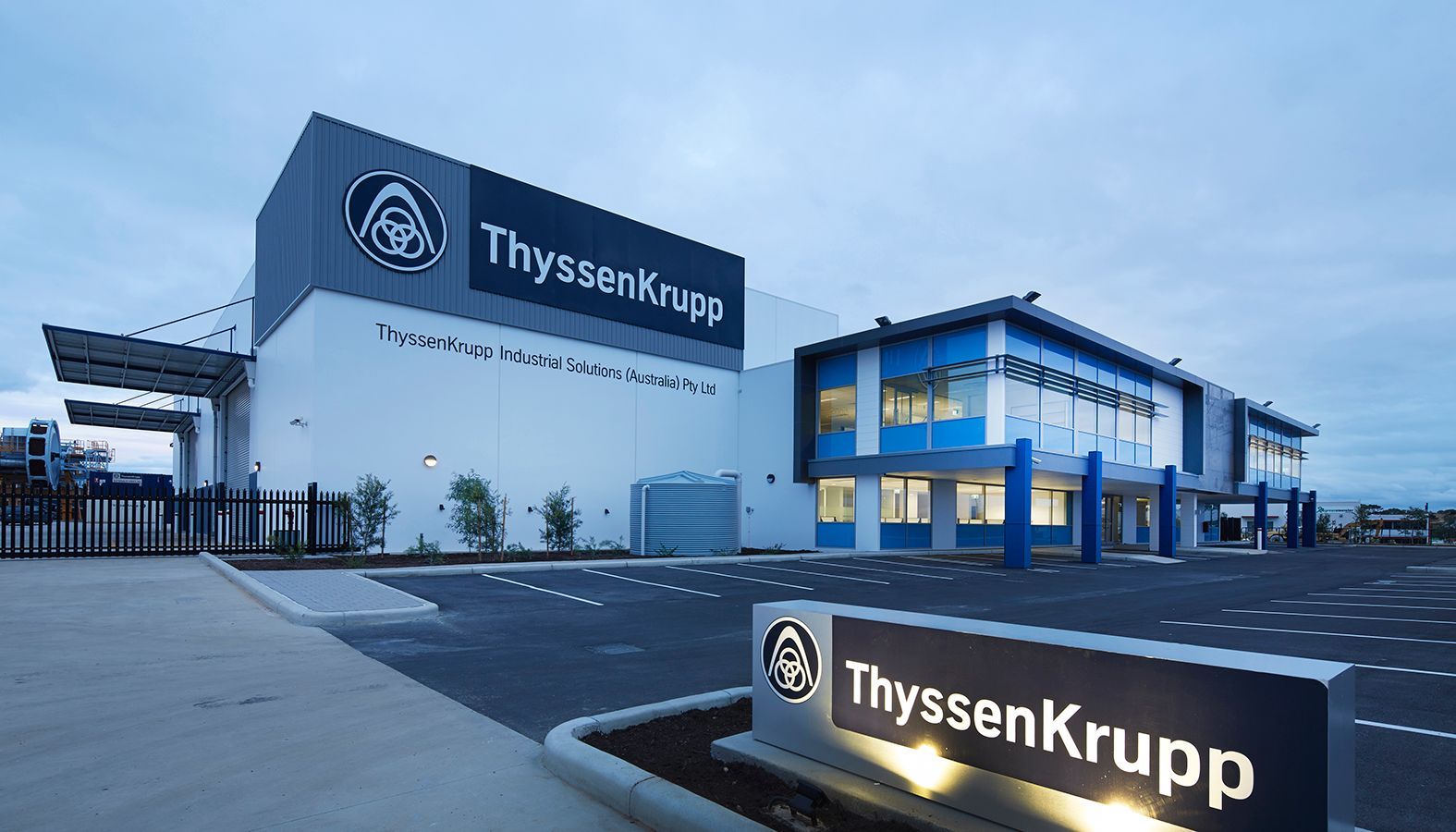PERTH, Western Australia: A big step forward was taken today in the future of digital shipbuilding with the unveiling of a submarine hull section designed in Germany with the plans digitally transmitted to a factory in Western Australia and constructed by a local engineering company.
ThyssenKrupp Marine Systems is one of several leading naval ship designer builders to embrace Integrated Product Design Environment (IPDE) for submarine development. This technology has been validated in the most challenging automotive and aerospace environments. It offers a “new way of doing business” and replaces the first or second generation systems used for the current naval shipbuilding program in Australia.
It effectively eliminates geography as a risk factor and allows full collaborative involvement with the customer at every step of the submarine’s life. A number of world class submarine builders use this German system and support ThyssenKrupp Marine Systems’ claim that substantial savings are possible in terms of cost and schedule. The risk associated with transferring information from one country to another is all but eliminated.
Chairman of ThyssenKrupp Marine Systems Australia, Dr John White, said that ThyssenKrupp was able to design the hull section at its Kiel, Germany shipyard for well-known West Australian shipbuilding and engineering company Civmec to use the latest technology to complete the build last Friday in Henderson, WA. This was an exercise to validate the company’s estimates with regard to production cost, quality and production schedules.
“Today’s revealing of the hull section at the Australian Marine Complex (AMC), Henderson is a perfect example of how leaders in the global shipbuilding industry are changing the way they will do business in the future. ThyssenKrupp Marine Systems is at the forefront of integrated digital design, construction and sustainment and sees IPDE as an area of huge potential as Australian shipbuilding meets the challenges of the future. The spin-off impact on advanced manufacturing in Australia will be enormous,” Dr White said today.
ThyssenKrupp Marine Systems is participating in the Federal Government’s Competitive Evaluation Process to select the International Partner to build Australia’s next generation of submarines and sees advanced manufacturing, using digital design, construction techniques and data management, as a key part of its approach.
“The use of digital technologies in advanced manufacturing provides a generational opportunity for our country, as we can now design and build a submarine, being one of the most complex pieces of defence equipment, by bringing all required skills and capabilities together and maximising cost and resource efficiencies. Integrated digital production extends across all aspects of the build, including fit–out, then configuration management, monitoring and support through the operating life-cycle of each submarine.” he said.
“With the Federal Government’s stated commitment to advanced manufacturing and the future of the Australian naval shipbuilding industry, we believe local industry can benefit from an Australian submarine build. It also complements Prime Minister Turnbull’s Innovation Statement last week which set Australia on the path towards a much more innovative and competitive era, something we fully endorse.”
“Importantly, it means that having agreed on the final design of the new submarine fleet in accordance with the Department of Defence’s specific requirements, the process of building the fleet can be completed in Australia using local companies like Civmec, Austal and ASC among others. They will effectively have TKMS as a partner in their workshops and drawing offices, 24/7, as part of a seamless digital data link – effectively an industrial internet.”
“The TKMS ‘digital shipyard’ system, based on the Siemens PLM TeamCentre software, neutralises geographic separation and enables construction with much less errors, re-work, and associated delays and cost increases, than with traditional shipbuilding practices.”
AMC-based Civmec’s Executive Chairman, Mr James Fitzgerald said “The construction of this submarine hull section is testament to the high levels of productivity and quality achieved through the use of technology. Civmec has achieved the transfer of data and the dimensional accuracy required for the construction of a modern submarine. Interfacing our production management system, Civtrac, with the TKMS IPDE has allowed the design detail to be transferred seamlessly into our manufacturing process control system.” The construction of the submarine hull section was a self-funded Civmec initiative to demonstrate the capabilities resident within the company.
Dr White said that his company has engaged already with approximately 500 companies around Australia who could take part in a local submarine build:
“There is no doubt from our Industry roadshow held earlier in the year around Australia there are significant local engineering, technology and construction skills right here. It also means that by entering ThyssenKrupp’s global supply chain, as many companies have now done through the industry day process, local businesses can be part of a viable national shipbuilding industry with the potential to replicate if not exceed the mining and car manufacturing industries,” Dr White said.
“Today’s exciting event here at Henderson is a tangible example of what the future of shipbuilding in Australia looks like.” he concluded.
Thyssen Krupp Marine Systems is one of the leading system providers for non-nuclear submarines and high-end naval vessels. The company stands for marine competence, innovative technologies and comprehensive and reliable Service. Thyssen Krupp Marine Systems offers cutting-edge technology as well as state of the art engineering “Made in Germany”. The company has delivered over 160 submarines to its customers worldwide and has experience in building submarines in the customer’s country as well as in its own yard.
Thyssen Krupp Marine Systems is part of the Thyssen Krupp group, one of the world’s largest diversified industrial and engineering groups. With around 155,000 employees in nearly 80 countries, in fiscal year 2014/2015 Thyssen Krupp generated sales of around €43 billion.










